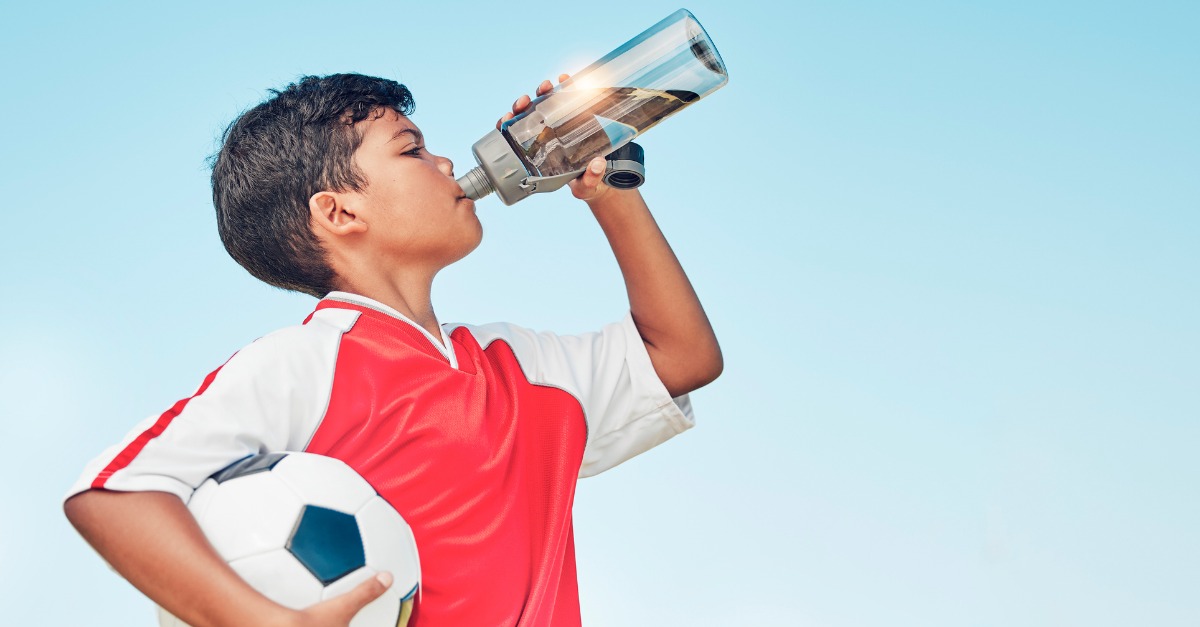Serving the Lowcountry and Coastal Empire of Georgia and South Carolina.
Thursday, August 1, 2024

With outdoor temperatures remaining high at the beginning of the school year, youth athletes often run the risk of becoming dehydrated on the playing field.
When a body loses more water than it takes in, dehydration can occur. Children who do not drink enough water, especially when engaging in physical activities, could experience dehydration, heat exhaustion, or heatstroke. In fact, kids are more susceptible to dehydration, because they sweat less than adults, yet they generate more body heat when playing.
“The name of the game is hydration,” says Dr. Jenna Sirmans, a pediatrician with SouthCoast Health. “Youth athletes should begin hydrating at least an hour or two before practices or games. If you start hydrating while you're at your practice or game, you're already playing catch up in terms of maintaining your hydration. The American Academy of Pediatrics recommends school-aged children drink four to eight ounces of water every 20 minutes, and for adolescents about nine to 10 ounces of water every 20 minutes while participating in athletics.”
Although sports drinks are highly marketed to athletes, Dr. Sirmans says clean drinking water is typically the best choice for kids to drink before and during sports activities. However, if the child prefers a sports drink, a sugar-free drink option is optimal. Additionally, eating a salty snack such as pretzels beforehand can help increase electrolytes. Fruits and vegetables are good options, because they are both nutritious and have high water content.
In addition to staying hydrated before and during sports activities, Dr. Sirmans says children who have been recently sick are at increased risk for dehydration. “Anyone who’s had a fever or a gastrointestinal bug really should take it easy before going back to activity.”
If outdoor temperatures are at 90 degrees or higher, Dr. Sirmans says she would urge coaches and athletes to be aware of the risk of dehydration. She recommends shortening practices when appropriate, offering longer or more frequent breaks, and practicing indoors when able.
According to the Centers for Disease Control and Prevention, coaches and athletes should schedule workouts and practices earlier or later in the day when the temperature is cooler. Pacing activity by starting slow and picking up the pace gradually is also advised.
Early signs of dehydration are dizziness, feeling faint, fatigue, nausea, and muscle cramping. When dehydrated, urine may appear darker and more concentrated. Be on the lookout for urine that’s medium-dark yellow, amber, honey, or dark orange, all of which can be indicative of dehydration.
If someone thinks they may be dehydrated, Dr. Sirmans suggests immediate action. First, they should stop play immediately, drink cold water, and begin to cool off by removing any equipment and finding a cool area to rest.
“I also would not have them plan to return to practice or the game for the time being,” she says. “And then another thing would be that using a cool towel or a rag is actually a better way to cool an athlete down as opposed to using a fan. Fans and high temperatures really only move the hot air around and they don't cool it. So you take the risk of increasing the athlete's temperature instead of cooling them down.”
Click here to schedule an appointment with a SouthCoast Health provider or call 912-691-3600.
Whether you are looking for a primary care doctor or a pediatrician, or another medical specialist, SouthCoast Health has you covered with its wide range of world-class healthcare services, available throughout the Coastal Empire and Lowcountry. SouthCoast Health has 120 physicians and medical professionals in 18 locations in Savannah, Richmond Hill, Pooler, Rincon, Baxley, Hilton Head, Hinesville, and Statesboro. SouthCoast Health offers comprehensive medical services including: Family Medicine, Internal Medicine, Pediatrics, Allergy and Asthma, Cardiology, Endocrinology, Eye Care, Imaging, Infectious Diseases, Nephrology, Neurology, Physical Therapy, Podiatry, Surgery, Clinical Trial Research Studies, Diabetic Self-Management Training Sessions, Dietetic Counseling, High-Risk Breast Cancer Clinic, Laboratory Services, Massage Therapy, Optical Shop, Pharmacy, and Urgent Care.